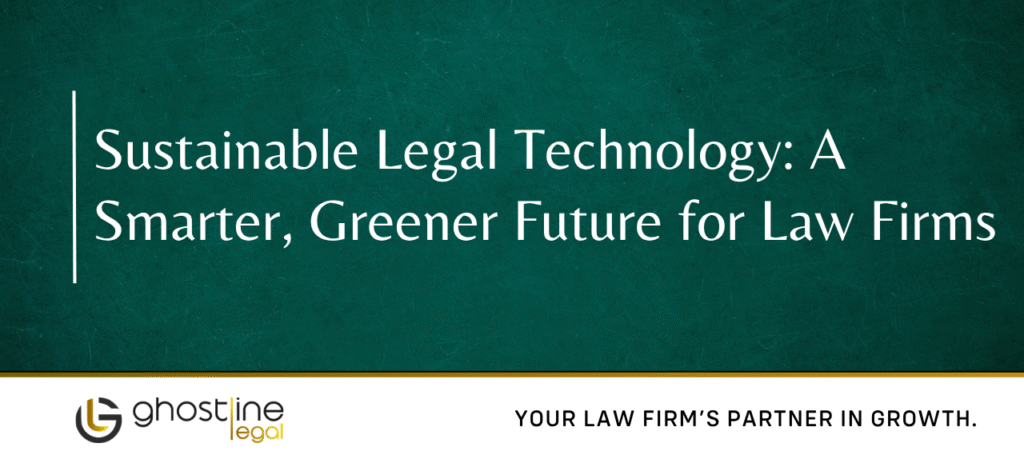This article has been authored by team Ghostline Legal.
Introduction
“Sustainable legal technology” refers to tools and practices designed to reduce energy consumption, minimise waste, and lower carbon footprints such as lightweight, efficient software that uses less data and loads faster. Additionally, the way a law firm manages documents and software can significantly affect the longevity and sustainability of its operations.
Law firms may not traditionally be seen as key players in sustainability, but rising client expectations especially from corporates are changing that. Clients now increasingly expect their legal service providers to reflect ethical and environmental values. For modern law firms, incorporating sustainability is not only about ethics, it’s a competitive advantage that strengthens brand value, enhances resilience, and fosters long-term client relationships.
The Growing Importance of Sustainability in Legal Services
Today, many corporate clients prioritise sustainability when selecting legal counsel. General Counsels often seek out firms that demonstrate both environmental consciousness and diversity. Some even refuse to engage with firms lacking inclusivity or clear ESG (Environmental, Social and Governance) commitments.
Law firms that share their clients’ sustainability goals are more likely to build lasting relationships. These shared values enhance brand reputation, drive internal performance, and set a strong foundation for growth.
In the Indian context, the Environmental Protection Act, 1986 plays a pivotal role. It provides a comprehensive framework for environmental management—covering pollution control, waste disposal, and conservation. It empowers the Central Pollution Control Board (CPCB) to regulate emissions and ensure environmental compliance. For law firms advising ESG-sensitive sectors, aligning with these regulations is essential for credibility and compliance.
Advantages of Sustainable Branding
Although law firms generally have a modest environmental footprint, the shift to remote work has opened up new opportunities to cut emissions. The COVID-19 pandemic demonstrated that virtual legal services are both feasible and efficient. Continuing hybrid or remote setups reduces commute-related emissions and aligns with SDG 8 (decent work) and SDG 12 (responsible consumption).
Remote working also contributes to SDG 5 (gender equality) by supporting work-life balance, especially for women. However, the pandemic highlighted disparities in caregiving responsibilities. Law firms can respond by offering flexible hours, part-time roles, and childcare benefits—policies that foster inclusivity and resilience.
Gender diversity is another critical component of sustainable branding. For example, several firms require a minimum representation of diverse candidates in interview pools. In India, while an increasing number of women graduate from law schools, far fewer remain in the profession. Addressing this gap is vital not only from a social perspective but also to meet client expectations around inclusion.
The ROI of Sustainable Legal Practice
Adopting sustainability offers both tangible and intangible returns for law firms:
Client Loyalty: Firms aligned with clients’ ESG goals often evolve into long-term strategic partners.
Reputational Boost: A strong sustainability stance improves directory rankings and public perception.
Cost Efficiency: Green practices like digital documentation – cut paper, printing, and travel costs.
Regulatory Preparedness: As ESG disclosures become mandatory in many jurisdictions, sustainable firms stay ahead of compliance curves.
By integrating ESG principles, law firms can better manage environmental risks, demonstrate sound governance, and unlock new business opportunities. For instance:
Clifford Chance has adopted science-based carbon reduction goals and actively advises clients on ESG strategy.
Herbert Smith Freehills has implemented a firm-wide ESG governance structure and shares regular ESG insights.
In India, Cyril Amarchand Mangaldas (CAM) and Trilegal have led ESG-focused webinars and developed firm-level ESG policies.
Conclusion
As environmental regulations tighten and client awareness increases, sustainability in legal technology is no longer optional it’s expected. Clients now evaluate law firms not just on legal expertise, but on how responsibly they manage their technology and operations.
Sustainable legal tech includes energy-efficient software, cloud-based tools, and intelligent document workflows that cut down on email exchanges and reduce reliance on high-energy data centres. These innovations not only drive operational efficiency but also reflect a firm’s commitment to environmental responsibility an increasingly important factor in client decision-making.
To conclude, prioritising sustainable legal technology is about more than modernising operations, it’s about aligning with a broader vision of ethical practice and environmental stewardship. Law firms that embrace this approach position themselves as forward-thinking partners in an evolving legal ecosystem, ready to contribute meaningfully to a greener and more responsible future.
Build credibility for your law firm with strategic PR – get started now!








